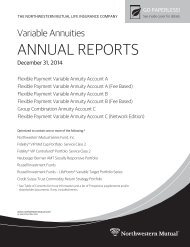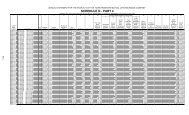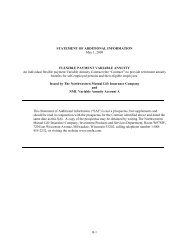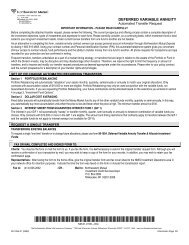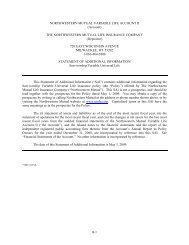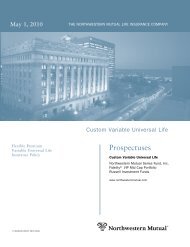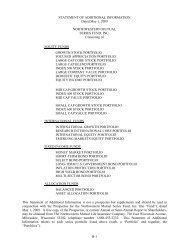T. Rowe Price has adopted these Proxy Voting Policies and Procedures (“Policies andProcedures”) for the purpose of establishing formal policies and procedures for performing anddocumenting its fiduciary duty with regard to the voting of client proxies.Fiduciary Considerations. It is the policy of T. Rowe Price that decisions with respect to proxyissues will be made in light of the anticipated impact of the issue on the desirability of investing in theportfolio company from the viewpoint of the particular client or Price Fund. Proxies are voted solely inthe interests of the client, Price Fund shareholders or, where employee benefit plan assets are involved, inthe interests of plan participants and beneficiaries. Our intent has always been to vote proxies, wherepossible to do so, in a manner consistent with our fiduciary obligations and responsibilities. Practicalitiesand costs involved with international investing may make it impossible at times, and at other timesdisadvantageous, to vote proxies in every instance.Consideration Given Management Recommendations. One of the primary factors T. RowePrice considers when determining the desirability of investing in a particular company is the quality anddepth of its management. The Policies and Procedures were developed with the recognition that acompany’s management is entrusted with the day-to-day operations of the company, as well as its longtermdirection and strategic planning, subject to the oversight of the company’s board of directors.Accordingly, T. Rowe Price believes that the recommendation of management on most issues should begiven weight in determining how proxy issues should be voted. However, the position of the company’smanagement will not be supported in any situation where it is found to be not in the best interests of theclient, and the portfolio manager may always elect to vote contrary to management when he or shebelieves a particular proxy proposal may adversely affect the investment merits of owning stock in aportfolio company.ADMINISTRATION <strong>OF</strong> POLICIES AND PROCEDURESProxy Committee. T. Rowe Price’s Proxy Committee (“Proxy Committee”) is responsible forestablishing positions with respect to corporate governance and other proxy issues, including thoseinvolving corporate and social responsibility issues. The Proxy Committee also reviews questions andresponds to inquiries from clients and mutual fund shareholders pertaining to proxy issues. While theProxy Committee sets voting guidelines and serves as a resource for T. Rowe Price portfoliomanagement, it does not have proxy voting authority for any Price Fund or counsel client. Rather, thisresponsibility is held by the Chairperson of the Fund’s Investment Advisory Committee or counselclient’s portfolio manager.Proxy Services Group. The Proxy Services Group is responsible for administering the proxyvoting process as set forth in the Policies and Procedures.Proxy Administrator. The Proxy Services Group will assign a Proxy Administrator who will beresponsible for ensuring that all meeting notices are reviewed and important proxy matters arecommunicated to the portfolio managers for consideration.HOW PROXIES ARE REVIEWED, PROCESSED AND VOTEDIn order to facilitate the proxy voting process, T. Rowe Price has retained RiskMetrics Group(“RMG”), formerly known as Institutional Shareholder Services (“ISS”), as an expert in the proxy votingand corporate governance area. RMG specializes in providing a variety of fiduciary-level proxy advisoryand voting services. These services include in-depth research, analysis, and voting recommendations aswell as vote execution, reporting, auditing and consulting assistance for the handling of proxy votingresponsibility and corporate governance-related efforts. While the Proxy Committee relies upon RMGresearch in establishing T. Rowe Price’s proxy voting guidelines, and many of our guidelines areconsistent with RMG positions, T. Rowe Price deviates from RMG recommendations on some generalpolicy issues and a number of specific proxy proposals.B-126
Meeting NotificationT. Rowe Price utilizes RMG’s voting agent services to notify us of upcoming shareholdermeetings for portfolio companies held in client accounts and to transmit votes to the various custodianbanks of our clients. RMG tracks and reconciles T. Rowe Price holdings against incoming proxy ballots.If ballots do not arrive on time, RMG procures them from the appropriate custodian or proxy distributionagent. Meeting and record date information is updated daily, and transmitted to T. Rowe Price throughGovernance Analytics, RMG’s web-based application. RMG is also responsible for maintaining copiesof all proxy statements received by issuers and to promptly provide such materials to T. Rowe Price uponrequest.Vote DeterminationRMG provides comprehensive summaries of proxy proposals, publications discussing key proxyvoting issues, and specific vote recommendations regarding portfolio company proxies to assist in theproxy research process. The final authority and responsibility for proxy voting decisions remains with T.Rowe Price. Decisions with respect to proxy matters are made primarily in light of the anticipated impactof the issue on the desirability of investing in the company from the viewpoint of our clients.Portfolio managers may decide to vote their proxies consistent with T. Rowe Price’s policies asset by the Proxy Committee and instruct our Proxy Administrator to vote all proxies accordingly.Alternatively, portfolio managers may request to review the vote recommendations and sign-off on all theproxies before the votes are cast, or may choose only to sign-off on those votes cast against management.The portfolio managers are also given the option of reviewing and determining the votes on all proxieswithout utilizing the vote guidelines of the Proxy Committee. In all cases, the portfolio managers mayelect to receive current reports summarizing all proxy votes in his or her client accounts. Portfoliomanagers who vote their proxies inconsistent with T. Rowe Price guidelines are required to document therationale for their votes. The Proxy Administrator is responsible for maintaining this documentation andassuring that it adequately reflects the basis for any vote which is cast in opposition to T. Rowe Pricepolicy.T. Rowe Price Voting PoliciesSpecific voting guidelines have been adopted by the Proxy Committee for routine anti-takeover,executive compensation and corporate governance proposals, as well as other common shareholderproposals, and are available to clients upon request. The following is a summary of the significant T.Rowe Price policies:Election of Directors – T. Rowe Price generally supports slates with a majority of independentdirectors. T. Rowe Price votes against outside directors that do not meet certain criteria relating to theirindependence but who serve on key board committees. We vote against directors who are unable todedicate sufficient time to their board duties due to their commitments to other boards. We also voteagainst inside directors serving on key board committees and directors who miss more than one-fourth ofthe scheduled board meetings. We may vote against directors for failing to establish a formal nominatingcommittee, as well as compensation committee members who approve excessive compensation plans.We support efforts to elect all board members annually because boards with staggered terms act asdeterrents to takeover proposals. To strengthen boards’ accountability to shareholders, T. Rowe Pricegenerally supports proposals calling for a majority vote threshold for the election of directors.Anti-takeover, Capital Structure and Corporate Governance Issues – T. Rowe Price generallyopposes anti-takeover measures since they adversely impact shareholder rights and limit the ability ofshareholders to act on possible transactions. Such anti-takeover mechanisms include classified boards,supermajority voting requirements, dual share classes, and poison pills. We also oppose proposals thatgive management a “blank check” to create new classes of stock with disparate rights and privileges.When voting on capital structure proposals, T. Rowe Price will consider the dilutive impact toB-127
- Page 4:
APPENDIX F - Proxy Voting Policies
- Page 9 and 10:
stocks that make up that index. Str
- Page 11 and 12:
Interest rate swaps do not involve
- Page 13 and 14:
the Adviser or Sub-Adviser will not
- Page 17 and 18:
Forward Contracts. The Portfolios m
- Page 19 and 20:
principal amount as the call writte
- Page 21 and 22:
Options on Foreign Currencies. The
- Page 23 and 24:
securities. The issuers of the unde
- Page 25 and 26:
the former pools. However, timely p
- Page 27 and 28:
CMO residuals are generally purchas
- Page 29:
utilize the underlying assets may r
- Page 32 and 33:
include range floaters which are a
- Page 34 and 35:
par unless the price of the underly
- Page 36 and 37:
to changes in interest rates genera
- Page 38 and 39:
corresponding floaters. The underly
- Page 40 and 41:
A Portfolio will not enter into suc
- Page 42 and 43:
egulations. The presence of an issu
- Page 44 and 45:
Portfolio TurnoverPortfolio turnove
- Page 46 and 47:
The ability of the Portfolio to ach
- Page 48 and 49:
Advisors, LLC, in accordance with t
- Page 50 and 51:
OWNERSHIP OF SHARES OF THE FUNDAll
- Page 52 and 53:
on the next $50 million, 0.50% on t
- Page 54 and 55:
Independent Registered Public Accou
- Page 56 and 57:
Name of Portfolio 2008 2007 2006Int
- Page 58 and 59:
Broker High Yield Bond BalancedAsse
- Page 60 and 61:
and cost of trade execution of Port
- Page 62 and 63:
Effective April 30, 2008, the Fund
- Page 64 and 65:
TAXES AND DIVIDENDSEach Portfolio i
- Page 66 and 67:
APPENDIX A - Credit RatingsDescript
- Page 68 and 69:
F2Good credit quality. A satisfacto
- Page 70 and 71:
. Moody’s Commercial Paper (short
- Page 72 and 73:
Plus (+) or minus (-)The ratings fr
- Page 74 and 75:
APPENDIX B - Directors and Officers
- Page 76 and 77: Name, Address, andYear of BirthDavi
- Page 78 and 79: APPENDIX C - Ownership of Shares of
- Page 80 and 81: SMALL CAP VALUE PORTFOLIOGeneral Ac
- Page 82 and 83: APPENDIX D - Portfolio ManagersOthe
- Page 84 and 85: PortfolioManager(s)FundRegisteredIn
- Page 86 and 87: Compensation of Portfolio ManagersM
- Page 88 and 89: management firms. Performance is pr
- Page 90 and 91: Portfolio managers are eligible for
- Page 92 and 93: PortfolioPortfolio Manager(s)Dollar
- Page 94 and 95: On August 25, 2005, the Court enter
- Page 96 and 97: MSA’s Equity Trading Department s
- Page 98 and 99: ERISA ClientsIn the case of client
- Page 100 and 101: Shareholder Ability to Call Special
- Page 102 and 103: • Exercise price• Participation
- Page 104 and 105: Amend Quorum RequirementsVote propo
- Page 106 and 107: Vote proposals to increase blank ch
- Page 108 and 109: employees of Investment Manager and
- Page 110 and 111: will not support the position of a
- Page 112 and 113: company specifies the voting, divid
- Page 114 and 115: egarding whether Investment Manager
- Page 116 and 117: 3. The issuer is an entity particip
- Page 118 and 119: manager(s) are responsible for maki
- Page 120 and 121: Global Corporate Governance: Invest
- Page 122 and 123: 13. The Proxy Group will review the
- Page 124 and 125: determined by those investment comm
- Page 128 and 129: shareholders and the effect on shar
- Page 130 and 131: portfolio company could have influe
- Page 132 and 133: The Proxy Voting Service will refer
- Page 134 and 135: that substantially differs from dom
- Page 136 and 137: 15. Janus will generally vote in fa
- Page 138 and 139: 46. For shareholder proposals outsi
- Page 140 and 141: 2. Staggered BoardIf a company has
- Page 142 and 143: proposed for a legitimate business
- Page 144 and 145: APPENDIX G - Portfolio Holdings Dis
- Page 146: ICP Securities LLCIntermonte Securi



